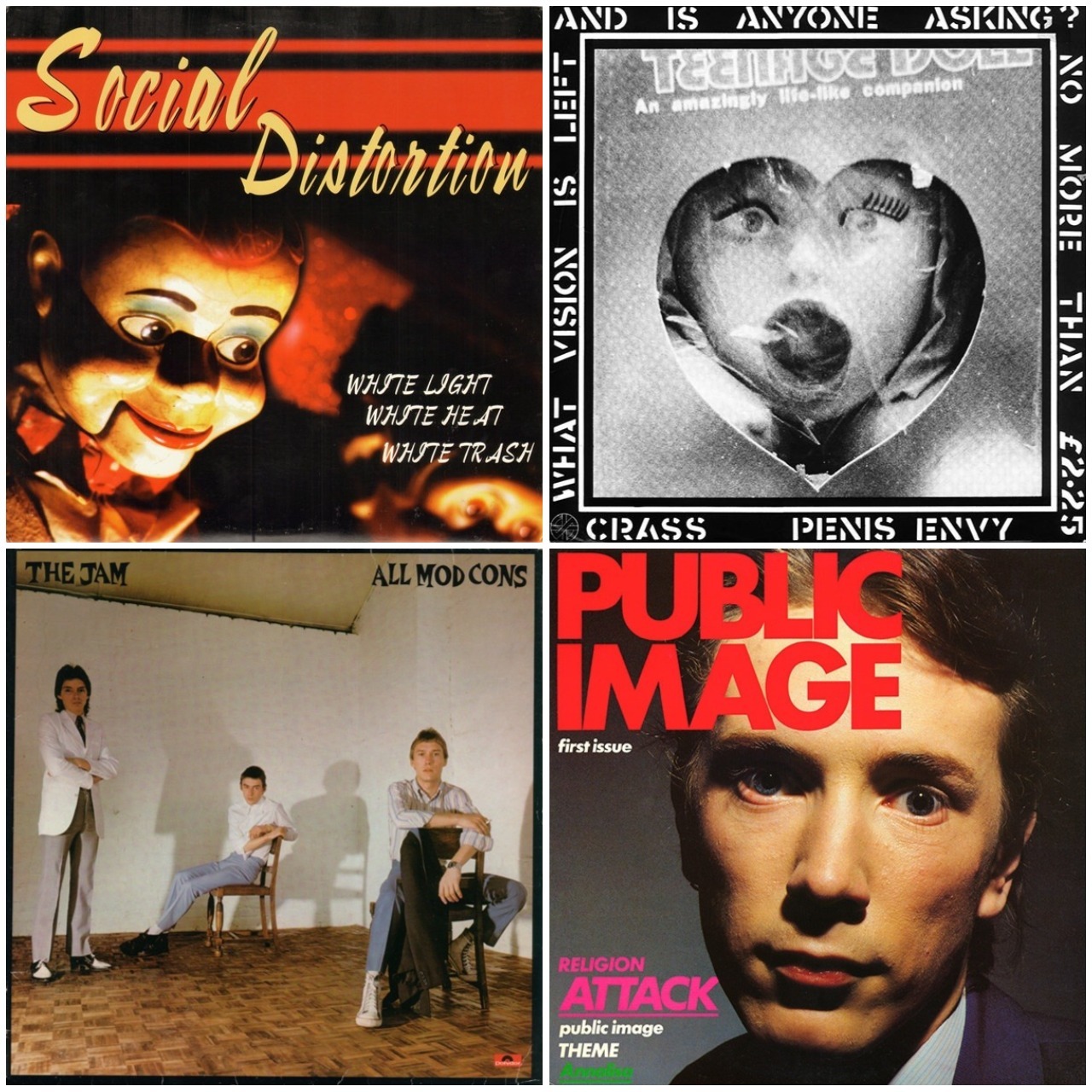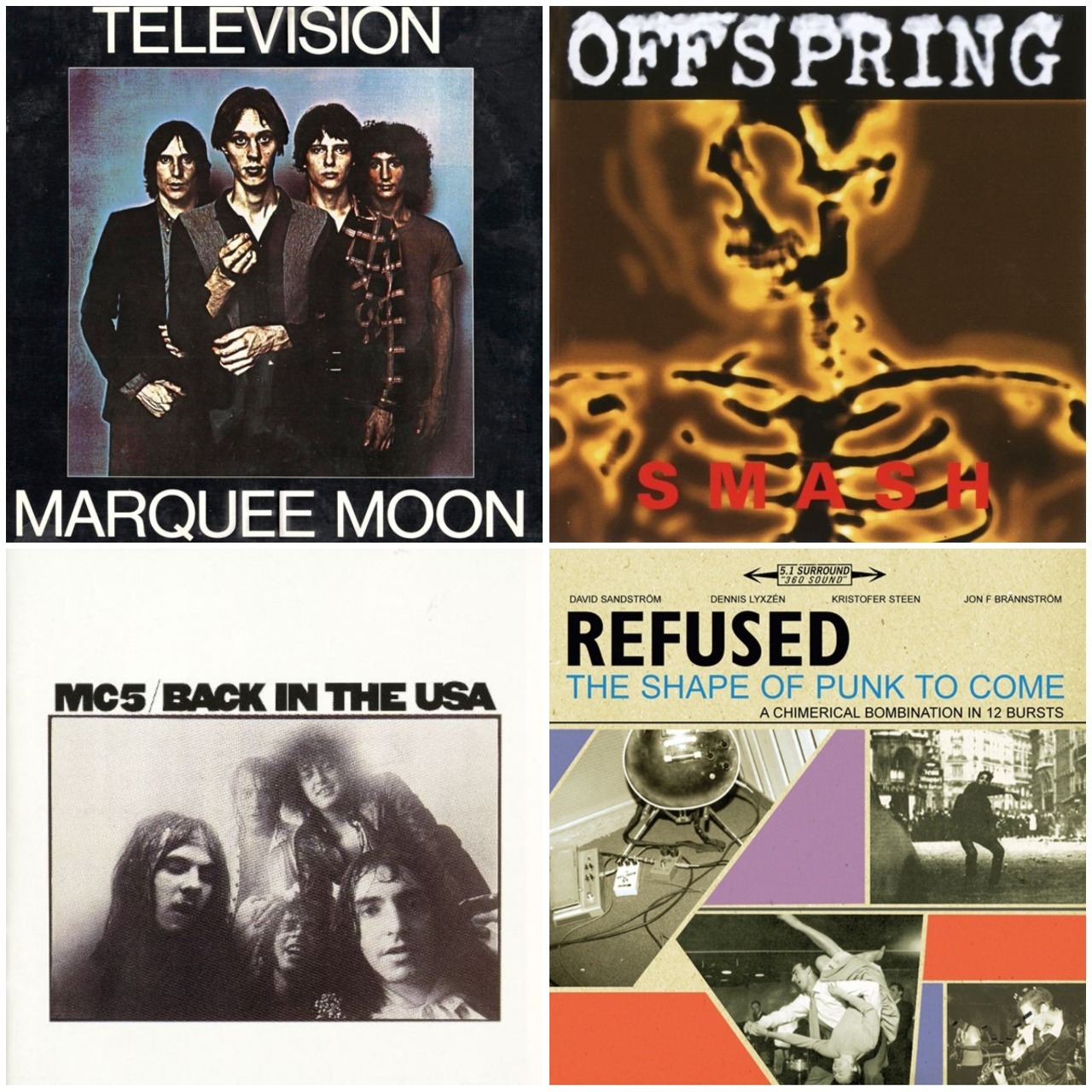40) Minutemen – Double Nickels On The Dime (1984)
The Minutemen’s hectic third album crams 43 songs into 74 minutes, with a dizzying spread of styles: cubist punk, funk, blues, jazz and Beefheartian weirdness. Led by singer-guitarist D Boon, who tragically died in a van accident a year later, there are skronky covers of Creedence and Steely Dan alongside Latino protest song Corona, later to become the theme to TV show Jackass.
“We were reacting against the arena rock of the 70s,” bassist Mike Watt told Classic Rock of his post-punk trio. “Wire and The Pop Group taught us that a band is whatever you want it to be. You don’t have to follow any rules. The punk movement was so inclusive, and it seemed that if you wanted in, you just had to bring something original – it was kind of a toll.
“The big joke was that we make a double album because the Hüskers do,” said Watt of the album’s creation in 2016. “We had one album done, they came into town with Zen Arcade, and we were like, ‘Fuck! We should do that!’ but we had no concept to unify them, so we made up stuff. One of ‘em was, ‘Sammy Hagar can’t drive 55’, so we said ‘Oh, well we’ll drive 55, because he makes safe music, but we’ll make crazy music’ – double nickels on the dime means driving 55… Nobody ever got the joke.”
“D Boon, Mike Watt and George Hurley probably didn’t realise how important this album would be for so many musicians when they made it,” said Maximo Park frontman Duncan Lloyd in 2017. “I have listened to this album more times than I can remember. It’s tight, playful, angry, clever, political, melodic. An essential classic.”
39) Bad Brains – Rock For Light (1983)
Formed in Washington DC in 1977 (and later banned from playing there, spawning the classic Banned In DC), Bad Brains were unlike any other punk band of their time. They interspersed breakneck punk with a fearsome combination of reggae and funk, knocking out a blistering attack that seemed to cover all bases with no apparent effort. Fuelled by inner tensions (singer HR would go on to battle issues with substance abuse later in his career), in their prime they laid out a template without which modern punk rock would not exist.
Famously listed by Kurt Cobain as one of his top 50 albums of all time, Rock For Light established Bad Brains as one of punk music’s most remarkable forces. In The Meek Shall Inherit The Earth, the band showed off their skill for changing pace and direction with almost alarming alacrity, segueing into sublime reggae straight after the raging punk of Riot Squad. One of the album’s most surprising successes came in enlisting The Cars frontman Ric Ocasek on production duties. Ocasek’s ear for pop sensibilities tempered the rough edges shown on their previous, self-titled debut, polishing them into a tightly-hewn unit and providing the template for the rest of their career.

38) Social Distortion – White Light, White Heat, White Trash (1996)
If Social Distortion had come from the UK, it’s most likely they would have been lumped into the burgeoning psychobilly scene and forced to spend their career playing with the likes of The Meteors and King Kurt. So fortunate for them, really, that they grew up in Fullerton, Orange County where their barnets were safe from ludicrous barberism and gigs free from eggs and flour. Along with other neighbouring Orange County bands TSOL, The Vandals, Agent Orange and The Adolescents, Social Distortion’s blues ‘n’ country-filtered punk was a big influence on the burgeoning SoCal punk scene of the 80s and 90s.
So, when they dropped their fifth album in 1996 – one which upped the aggression, the tension and the unapologetic nihilism of their sound – it was wasn’t without its risks. But in shedding the bulk of their twangy, rootsy trademarks, their music became sharper, more focussed, and a far more tantalising prospect. It combined the tightly-honed songwriting skills they’d developed on their preceding albums with the anger and rage of their debut Mommy’s Little Monster, and created an enduring classic in the process. In lead single I Was Wrong, the band unwittingly produced a radio hit, which ultimately lead to that coming of age moment experienced by all punk bands crossing from obscurity to the mainstream: their longterm fans calling them sell outs and denouncing them in their droves. Still, it harmed the band little, with the album eventually earning itself a place as one of the cherished classics of the punk canon.
With a chequered, tragic history and ever-revolving line-up, Social Distortion released just seven albums in the space of 28 years, but quite appropriately, their most recent, 2011’s Hard Times And Nursery Rhymes was put out by the label whose stable of many bands they inspired: Epitaph.
37) Crass – Penis Envy (1981)
The Sex Pistols may have written Anarchy In The UK, but it was Crass who meant it, man. Formed in 1977, with each of their independently released records bearing a countdown stating their intention to split up in 1984, the band took anarchist ideals to a whole new level, squatting venues (one of which was a disused bingo hall that is now The Garage in London) and taking part in numerous direct actions, including the Stop The City demonstrations, which effectively brought the capital to a standstill.
Crass put out some truly great albums, and perhaps there is none greater in their catalogue than Penis Envy, an impassioned, HMV-banned, 30-minute anarcha-feminist rant that took aim at various facets of female oppression, and featured exclusively female vocals in the form of Eve Libertine and Joy De Vivre. The album won the band a not-insignificant amount of good, old-fashioned tabloid outrage when they successfully managed to pull off a hoax offering a flexi disc single from the album to be given away free with teeny bopper magazine Loving, drumming them up a shit load of free press in the process. Few bands, punk or otherwise, have ever been so controversial. And, yes, they did split up in 1984.
36) The Jam – All Mod Cons (1978)
A brilliant comment on The A/V Club’s review of All Mod Cons says: “The best thing about the Jam was their uncompromised Britishness. The Clash may have been bored with the USA, but The Jam acted like (apart from soul music) they’d never even heard of the place.” The first truly great album by The Jam, All Mod Cons is not necessarily the band’s best or most punk album – Setting Sons and Sound Affects pip it on both counts – but it is the one closest to the UK punk’s ground zero and the one that truly cemented them as the voice of British youth.
A cover of the Kinks’ David Watts gave you an idea of where Weller thought the bar was set: the hopes and dreams of the playground, factory floor and dole queue. To Be Someone takes you from those dreams to their logical conclusion – from dreams of being “a famous footballer, a rock singer” to blowing it and being kicked of clubs “with the rest of the clowns”. Mr Clean had lines that McCartney at his peak would have cherished (‘Daylights dawns, you wake up and yawn, Mr. Clean/A piece of toast from the one you love most, and you leave’) though the class hatred at its heart wouldn’t have fit on any Beatles album.
The album ends with two devastating slices of city life – ’A’ Bomb In Wardour Street and Down In The Tube Station At Midnight – Wardour St’s vision of a “Doctor Martin’s apocalypse” surely referring to the rise of Oi! and the National Front as it conjures up a vision of ‘rape and murder throughout the land’ (‘My head’s been kicked in and blood’s started to pour/Through the haze I can see my girl/Fifteen geezers got her pinned to the door’). Tube Station is the masterpiece though: a nightmarish short story set to a thunderous bassline with a novelist’s attention to detail: ‘The last thing that I saw,’ says Weller’s brutally beaten narrator, ‘As I lay there on the floor/Was “Jesus Saves” painted by an atheist nutter/And a British Rail poster read “Have an Awayday – a cheap holiday – Do it today!”’
Along with Strummer and Jake Burns, it was the moment that Weller became the Poet Laureate of council estate kids everywhere.
35) Public Image Ltd – First Issue (1978)
Following a cultural phenomenon like the Sex Pistols was always going to be a big ask. The Sex Pistols weren’t simply a band – they’d been adopted by both media and mainstream (friends and foes alike) as the focal point of an entire movement, an attitude, a mode of dress, a way of life. As the most obvious and articulate of the Pistols, their vocalist and lyricist, Johnny Rotten, pretty much exemplified punk. So when he left the band in January ’78, with the words: “Ever get the feeling you’ve been cheated?” punk’s foot soldiers (largely unimpressed by Malcolm McLaren’s choice of successor: tiresome nihilistic smack catastrophe Sid Vicious) looked to their faltering scene’s departing prime mover for musical direction.
Readopting the surname Lydon, the erstwhile Rotten – having cleansed his musical palate with a trip to Jamaica, talent-spotting for Virgin’s reggae imprint Front Line – assembled his new troops for his next assault on prevailing sonic conservatism: Public Image Ltd, and their debut album First Issue.
The first single released from the album boasted an uncompromising Lydon lyric; a bold statement of self-determination, a message as much to his identikit punk audience as to his doubting detractors that John Lydon’s Rotten past was behind him. It was allied to a driving, dub-deep Jah Wobble bass riff. Where punk had been dense, this was spacious. Its sound was post-punk and its name was Public Image.
Initially given a merciless thrashing on release, the album has now, rightly, claimed its place as one of punk’s most influential albums, thanks in no small part to its pioneering effect on the then nascent post-punk movement.

34) Television – Marquee Moon (1977)
Television’s Marquee Moon owes as much to Miles Davis and Frank Zappa as it does to any thing as feral as the Pistols. The album is without doubt the major touchstone for all the ‘The’ bands and art rockers of the past few decades: it’s almost impossible to listen to The Strokes without hearing Television’s Richard Lloyd’s guitar sound, or Franz Ferdinand without thinking of Tom Verlaine’s vocals.
Although it’s right that it’s included in this list, Marquee Moon, with its jazz influences and virtuoso solos, is hardly punk. However, it is still easy to see why the album is held aloft as one of new wave’s finest musical accomplishments, with more collective musical ability than any of their peers – with the possible exception of Talking Heads.
“I consider this to be one of the greatest rock guitar records ever,” legendary producer Butch Vig told Classic Rock in 2015. “It’s as if you stuck your finger in a wall socket and you got a jolt from this jarring, fractured, punky guitar playing. It’s just so unusual and interesting sounding – it kind of takes you by surprise at first.
“I love the production on this record. Andy Johns recorded the album, but he made it sound as if the band is right there in your living room. It’s dry and in your face, with a tense, relentless energy that doesn’t let up for a second. And, of course, every track is fantastic.
“When I hear this record, I think, ‘This must be what electricity sounds like.’ The way Tom Verlaine and Richard Lloyd played guitars together is so fascinating to me. A very influential band.”
33) The Offspring – Smash (1994)
Released on April 8 1994, The Offspring’s third studio album would herald pop-punk’s mainstream acceptance. Through the likes of The Offspring, Green Day and then Blink-182, it would become even bigger than grunge; the preceding underground music scene also swiftly commercialised.
Smash by name, smash by nature – the band’s mainstream cannonball spawned several massive singles, including the enduring rock club classic Self Esteem. Fast forward 12 months and the album was on the cusp of becoming the most successful independent album of all time – it eventually sold a staggering 20 million copies worldwide.
“I see Ignition as the record that first sounded like The Offspring,” Dexter Holland told Total Guitar. “But we were really excited recording Smash. We’d been touring with NOFX and Pennywise and were in the mix of the scene. The songs just got better, I guess. But they were written quickly.”
The album inspired a legion of bands in its wake. “It’s flattering, but it makes me feel uncomfortable because I don’t see us in the same categories that I see our idols,” said Holland of the album’s legacy. “Making you want to start a band is what the Ramones, Sex Pistols and The Clash do. Not us!”
“That album had catchy riffs. We loved bands that were very punk, but these bands didn’t always have great melodies. We added something musically memorable to the energy of punk music.”
For follow-up album Ixany On The Hombre, The Offspring would leave revered SoCal punk label Epitaph in favour of Sony’s Columbia. And the rest is platinum-plated history.
32) MC5 – Back In The USA (1970)
A hair-blowing joyride packed with growling riffs and punchy tempos, the MC5’s shortest album was as much a celebration of rock’n’roll as a tuneful ode to the pageantry of youth. Showcasing a revved-up 50s cover on each side, these 11 tracks supplied the DNA for the 90s power-pop revolution.
“The chosen path with Back In The USA was to make this an album about the wilderness of youth, replacing the profanity-laden political tirades with peppy celebrations of what it means to be young,” said Sputnik Music of the album in 2010. “Where Kick Out The Jams showed the MC5 as a free-thinking revolutionary force, Back In The USA shows them as young men, doing what young men are wont to do – have fun, party, and celebrate the best years of their lives. The lyrics to songs such as Tonight, High School or Shakin’ Street are indicative of this, while Teenage Lust provides the perfect description of a teen male’s hormonal woes.
“At its best, this album sizzles just as much, if not more, than Kick Out The Jams, albeit in a different way. Whether it’s the simple, crackling retelling of Little Richard’s Tutti Frutti, the old-style rebellious lyrics of The American Ruse, the simple, catchy High School or the vibrant Shakin’ Street, this album’s strongest moments are among the best pop-rock songs ever crafted.”
“This record is an addictive joy for the myriad experiences of youth, for the eternal combination of pleasure, excitement, boredom, anger, and frustration that everyone experiences during that fragile transition between adolescence and adulthood,” wrote PopMatters in 2003. “That attitude is mirrored in the hot-wired treble sound of the record, a sound so tightly wound it threatens to jump off the turntable at any moment and sear your brain. Wayne Kramer’s guitar continuously asserts its presence with a maddeningly propulsive manic energy that makes you forget that the Who, the Kinks, or the Kingsmen ever existed.”
31) Refused – The Shape Of Punk To Come (1998)
For a long time it looked like Refused were destined to become hardcore punk’s very own Picasso: undervalued, unappreciated and ignored in their own time, but later revered for their artistic genius. And it was all thanks to this, the Swedish firebrands’ explosive swansong. By 1998 – as portrayed in the documentary Refused Are Fucking Dead – this fine but fairly unremarkable Swedish hardcore band were burnt out and disillusioned by months on the road playing to tiny audiences.
And so, as a final raised finger to the world before they broke up, they created the thrillingly audacious The Shape Of Punk To Come, smashing together smart political polemic, punk rock, metal, poetry, jazz (the title is a nod to Nation Of Ulysses’ The Sound Of Jazz To Come, itself a reference to Ornette Coleman’s The Shape Of Jazz To Come), earsplitting noise, techno and a whole lot of righteous fury.
The album’s centrepiece, the electrifying New Noise, remains one of the most astonishing calls to arms ever committed to record. Eloquent, charismatic frontman Denis Lyxzen’s screams and whoops are as joyful as they are intense, and they echoed down through the generation of new bands that followed them. The moment, half way through the song, when the sound fades, before building to a truly gargantuan chorus of riotous crowd noise and elephantine riffs, makes you feel absolutely invincible.
It was, at the time, a truly unique game-changer. In the years after their split, many have attempted to imitate Refused, but none have captured the wild energy of this album. So when the Swedes returned in 2012, to face audiences hundreds of times bigger than those they played to in 1998, it was a relief to find the fire, intelligence, passion and sheer energy was burning brighter than ever before. Refused, it turned out, weren’t quite as dead as they claimed. And this album still sounds like the future.
